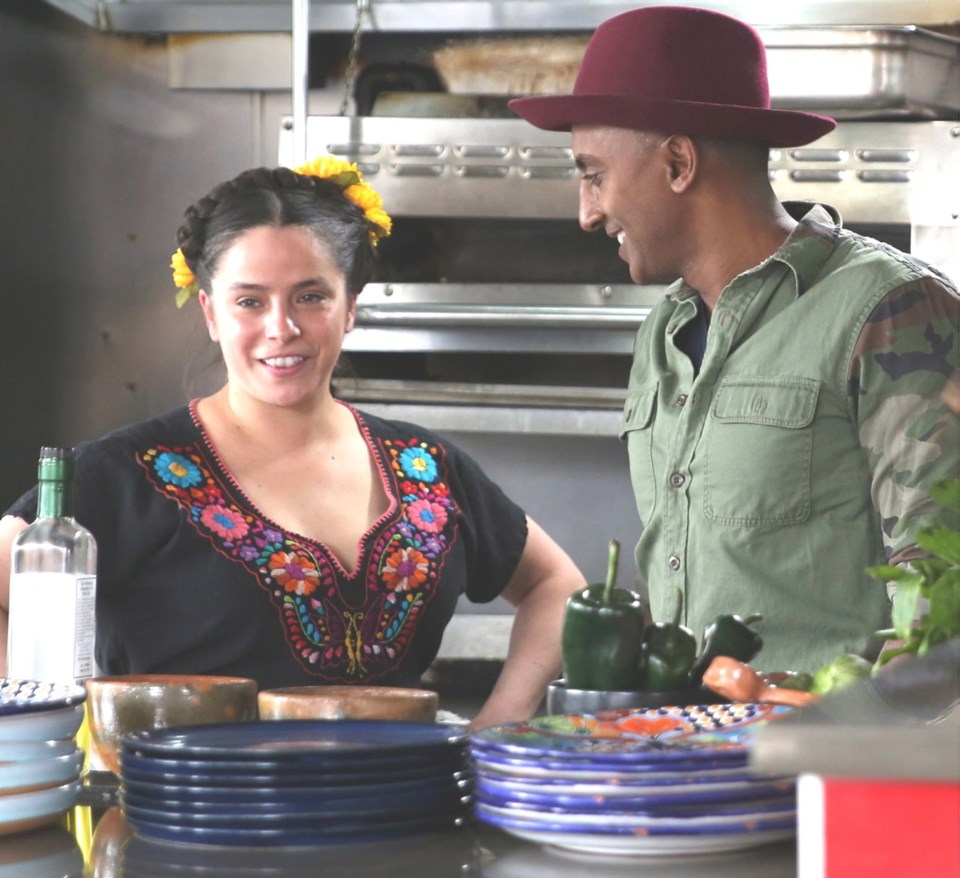PASADENA, California — What makes America great? If you ask chef Marcus Samuelsson, it’s food and the diverse ways it landed on our plates.
Samuelsson, the James Beard Award-winning chef and restaurateur, will prove that point when he hosts No Passport Required, premièring on PBS July 10.
Samuelsson and his team will visit six cities, uncovering little pockets of ethnic cuisine and the exotic cultures that created them.
He is an immigrant himself. He was born in Ethiopia but grew up in Sweden, where he and his sister were adopted by a Swedish geologist and his wife. Samuelsson learned his craft from watching his grandmother, Helga, in the kitchen, he says.
“She was an amazing cook, and she helped me from meatballs to dumplings, to just learning about herring, and all this stuff. And for me, as a six-year-old, to learn the values of cooking and understanding flavour points, and I’ve only had one job — to work with food. I’m always so excited to represent her and the chefs and the mentors that I’ve had that come from all backgrounds … ”
The show will explore such enclaves of culinary cross-pollination as the Vietnamese in New Orleans, Mexicans in Chicago, Haitian culture in Miami, Ukrainian-Russian traditions in Seattle.
“This partnership will … represent my journey and also the journey of all the chefs that gave someone from my kitchen or myself a shot,” he says.
“And yeah, it’s funny what you can learn in grandma’s kitchen.”
Samuelsson thinks the immigrant experience is unique, and he understands it well.
“They’re uprooted very often,” he says. “There’s something dramatic happening in their country. They were uprooted from everything and came to America, and very often food — even if they had other gigs and other jobs and other things in their homeland — food was their first entrée into this country. And they made a living out of it. And I think that shows how incredible America is and can be and will be. And I think we, as content providers, have a huge opportunity and responsibility to show that.”
Samuelsson studied at the Culinary Institute in Gothenburg, Sweden, and later apprenticed in Austria and Switzerland.
He was 23 when he immigrated to the U.S. and landed a job as an apprentice at an upscale restaurant in Manhattan.
A year later, he became the executive chef there and copped a three-star review from the New York Times.
He has a grown daughter and a two-year-old son. He says he wonders about teaching his son the proper values.
“How do I explain for him this moment and where were you during this moment? Did you add something to the conversation — when he’s 15, 12 or 20? As an immigrant, I left cushy Sweden to come to America because I believed in diversity, right? And this is something that you can really [see] as an immigrant. We’re challenged at this moment as people of a diverse background. We’re challenged to be able to tell a yummy, delicious story that is about food, but is also about culture,” he says.
“We’re going to see people, maybe we go to a wedding, or maybe we go to a DJ set, and what’s the food after that? Maybe we go to karaoke. We will be able to bring so many different cultures into this and be able to bring them to people’s homes and then also add commentary around that.”
Samuelsson, 47, thinks the show will be distinctive. “Because you can follow up with comments and create communities that are strong, and we can follow up in a way, whether it’s on social media or through other ways that maybe you wouldn’t have the opportunity on other shows.”
While everyone may have his favourite Chinese or Mexican restaurant, there are countless other ethnic delights to be sampled, says Samuelsson. “What’s amazing as a cook and as a food lover is our diversity. Whatever happens, try to go somewhere else in the world. About 20, 30 years later, we have that food in our country, and it’s amazing. We’re better for it … I wouldn’t even imagine how America would taste without immigrants, and that restaurant or food has been that first entry point. What’s cool now is that something like Eater (an online food site and co-producer) devotes a whole editorial team to not just tell the story about the fancy restaurant, but actually tells the story about Sri Lankan food in Staten Island or Ethiopian food in D.C.”
The PBS producer of the series, Pamela A. Aguilar, describes Passport this way: “It’s Marcus coming into a city, meeting individual characters, and then through their stories and their experiences really diving deep into that immigrant community. But it’s also [about] how there’s always a fusion within the greater American culture and then seeing what those touch points are, and how then we can celebrate the differences and also celebrate the bridging of it all. So therefore, [with] No Passport Required, you can basically go around the world but stay in the U.S. because we celebrate everyone equally.”



